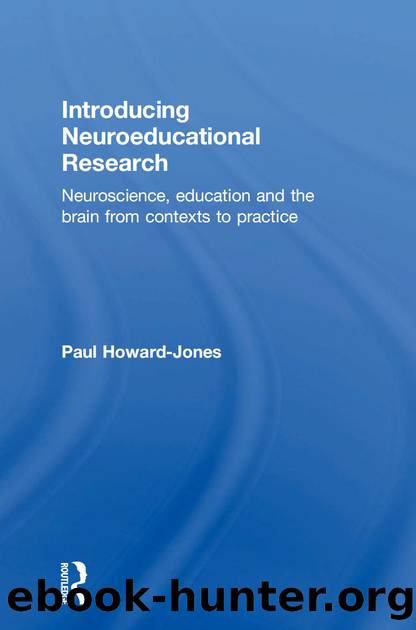Introducing Neuroeducational Research by Howard Jones Paul;Jones Paul Howard;

Author:Howard Jones, Paul;Jones, Paul Howard;
Language: eng
Format: epub
Publisher: Taylor & Francis Group
Published: 2010-08-15T00:00:00+00:00
Experiential methods of investigation
In some structured interviews aimed at collecting participantsâ experiences, the information provided and the questions presented can focus a respondent's attention on a set of very specific issues in a very specific manner. For example, when exploring learnersâ experiences with a teaching strategy, it seems reasonable to ask teachers when they use such a strategy in their lessons. Here, the researcher may decide that meanings are so aligned to a particular data gathering context that the coding can be based securely on these, with interpretations âanchored in the external appropriate realityâ(Swift, 2006). In this case, it might be assumed that the researcher and participants share some similar sense of what âusing a strategyâ means. But in interviews that aspire to capture the respondent's authentic experience, any assumption that the researcher shares a common set of meanings with their participants is more questionable. Indeed, the âappropriate realityâ of each participant must be part of what is being investigated, if we are to understand their meaning in what they are saying. For example, in a study of how learners value a strategy in their learning, it cannot be assumed that a researcher can pre-guess how their participant will approach the issue, the way in which he/she will want to express their experiences or even what questions or prompts the researcher should use to illicit the most valuable responses. On studying a recording of the interview, there may be many important clues in the language, terms and intonation used, but to predefine clear codes by which to identify these appears premature â how can the researcher already know what they are looking for? That creates a classic chicken and egg situation: interpretation is required in order to generate appropriate codes, yet codes are required in order to make the interpretation. Of course, a similar problem can arise in the type of qualitative interpretation of social evidence discussed above, when analysing social discourse and observations of social behaviour, but the aim of collecting someone else's authentic experience makes the determination of meaning (i.e. their meaning, rather than the researcher's) more problematic.
Download
This site does not store any files on its server. We only index and link to content provided by other sites. Please contact the content providers to delete copyright contents if any and email us, we'll remove relevant links or contents immediately.
Chaco's Northern Prodigies : Salmon, Aztec, and the Ascendancy of the Middle San Juan Region after AD 1100 by Paul F. Reed(337)
Law Enforcement Interpersonal Communication and Conflict Management by Brian Douglas Fitch(331)
Digital International Relations by Unknown(324)
Critical Perspectives on Human Security : Rethinking Emancipation and Power in International Relations by David Chandler; Nik Hynek(313)
The Enduring Color Line in U.S. Athletics by Krystal Beamon Chris M. Messer(309)
Skilled interpersonal communication: Research, theory and practice, Fifth edition by Owen Hargie(309)
Evidence-Based Policy Making in Labor Economics by Hamermesh Daniel S.;Nottmeyer Olga K.;Nottmeyer Olga;King Sarah;King Sarah;King Sarah;(275)
EPSO CAST Political affairs EU policies: How to succeed in the selection procedure by Franco Reverte José María(271)
Writing Public Policy - A Practical Guide to Communicating in the Policy Making Process by Catherine F. Smith(256)
Threshold Concepts in Women's and Gender Studies by Christie Launius Holly Hassel(249)
Criminological Theory in Context by John Martyn Chamberlain(248)
Tibeton Yoga Its Secret Doc by Evans-Wentz(244)
Positive Psychology and Spirituality in Counselling and Psychotherapy (Conflict, Ethics, and Spirituality, 12) by unknow(244)
Social Problems, Social Issues, Social Science by James Wright(243)
Rothschild and Early Jewish Colonization in Palestine (Geographical Perspectives on the Human Past) by Ran Aaronsohn(240)
Play in child development and psychotherapy: toward empirically supported practice by Sandra W. Russ(236)
Cognitive Development in Infancy and Childhood (Elements in Child Development) by Mary Gauvain(234)
Latin American Politics and Society by Gerardo L. Munck & Juan Pablo Luna(207)
What Makes a Social Crisis?: The Societalization of Social Problems by Jeffrey C. Alexander(206)
